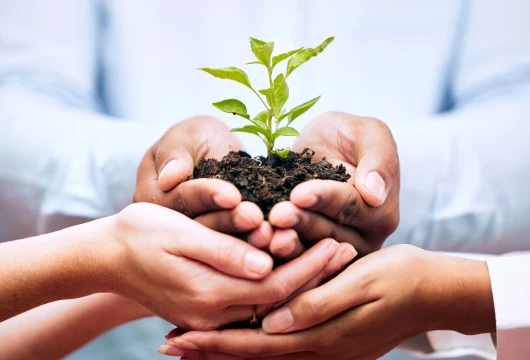Global Companies Drive Sustainable Agriculture for Carbon Credits
In a significant initiative to combat climate change and support farmers, four global giants—Bayer, GenZero (a subsidiary of financial firm Temasek), Shell, and Mitsubishi—have come together to empower Indian farmers through a groundbreaking carbon credit program. This initiative promotes adopting sustainable agriculture practices, enabling farmers to generate carbon credits while improving their livelihoods.
The carbon credits are generated through innovative farming techniques such as Alternate Wetting and Drying (AWD) and Direct Seeded Rice (DSR), which are designed to reduce methane emissions from rice paddies, a significant source of greenhouse gases (GHGs).
Positive Impact of the Good Rice Alliance
The project, known as *The Good Rice Alliance*, has made significant strides during its pilot phase. Launched over a year ago, the initiative has positively impacted 10,000 farmers across more than 25,000 hectares of land. By implementing sustainable farming practices, these farmers have collectively reduced around 100,000 tonnes of carbon dioxide equivalent (tCO2e) in methane emissions annually.
These reductions are now being translated into carbon credits, which can be traded on voluntary carbon markets (VCMs), providing an additional source of income for farmers. This innovative approach helps farmers contribute to the global fight against climate change while improving their financial well-being.
Expanding Sustainable Agriculture Efforts
Building on the success of the pilot phase, the alliance now plans to expand its reach. The program aims to cover an additional 8,500 hectares, bringing even more farmers into the fold and reducing methane emissions from rice cultivation.
One key focus of the expansion will be the scientific measurement of greenhouse gas emissions from rice paddies, ensuring that emission reductions are accurately recorded and certified. This will help generate even more carbon credits, creating a robust system that benefits both the environment and the farming community.
Along with expanding the area under sustainable farming practices, the alliance is committed to strengthening its support system for farmers. This includes providing ongoing education and resources to help farmers implement and maintain these eco-friendly practices and ensuring they have access to the tools and technologies needed to succeed.
Methane Emissions: A Major Challenge
Paddy rice cultivation is a significant contributor to global methane emissions. Methane is a potent greenhouse gas with a global warming potential 27 times that of carbon dioxide. Rice farming is responsible for about 11% of global methane emissions, making it a critical area for climate action.
Rice paddies are particularly problematic because the flooded fields create an anaerobic environment ideal for methane-producing bacteria. However, using methods like Alternate Wetting and Drying (AWD), farmers can reduce the amount of time their fields are flooded, significantly reducing methane emissions.
*Direct Rice (DSR)*, another technique the alliance promotes, involves planting rice seeds directly into the soil instead of traditional methods that require extensive flooding. This reduces water usage and minimizes methane emissions, further contributing to climate change mitigation.
India’s Role in the Voluntary Carbon Market
India is emerging as a global leader in the voluntary carbon market, which allows companies and individuals to offset their carbon footprints by purchasing carbon credits from certified projects that reduce or remove GHGs from the atmosphere. Nature-based solutions, such as reforestation and sustainable agriculture, have become critical players in this market.
In 2022 alone, nature-based projects accounted for 45.8 million carbon-resilient credits. India’s burgeoning carbon market, valued at over $1.2 billion, includes over 1,400 projects across various sectors. These projects drive innovation and foster partnerships between corporations, startups, and NGOs, all working together towards the country’s ambitious net-zero goals.
By participating in this market, Indian farmers can directly benefit from global climate action efforts. The carbon credits they generate through sustainable practices can be sold to corporations looking to offset their emissions, providing farmers with a new source of income while contributing to global sustainability goals.
Empowering Farmers for a Greener Future
The collaboration between Bayer, GenZero, Shell, and Mitsubishi is a prime example of how large corporations can leverage their expertise and resources to create positive social and environmental impacts. By empowering farmers with sustainable agriculture practices and enabling them to participate in the carbon credit market, the initiative is helping to create a greener future for India and the world.
The Good Rice Alliance’s expansion into more rice-producing states—such as Andhra Pradesh, Bihar, Haryana, Karnataka, Odisha, Tamil Nadu, Telangana, Uttar Pradesh, and West Bengal—underscores the initiative’s commitment to broadening its impact. With rice farming occupying 15% of the world’s total agricultural land (more than 150 million hectares), the potential for methane emission reductions is vast. The alliance is poised to make a significant dent in global GHG emissions by scaling up these efforts.
The Future of Sustainable Agriculture
As the world faces the escalating impacts of climate change, sustainable agriculture is emerging as a critical solution to environmental and socio-economic challenges. Projects like The Good Rice Alliance demonstrate that addressing pressing issues like methane emissions is possible while supporting farmers and boosting their incomes.
Adopting sustainable practices like AWD and DSR helps reduce methane emissions and conserves water, another critical resource in India. By empowering farmers to adopt these techniques and participate in the carbon credit market, the alliance is creating a model for sustainable agriculture that can be replicated across the globe.
The alliance’s success could inspire similar initiatives in other rice-producing regions, creating a ripple effect that promotes sustainable farming practices worldwide. With continued collaboration between corporations, governments, and farmers, the vision of a greener, more sustainable future is within reach.
For more in-depth analysis and inspiring climate news, click here

